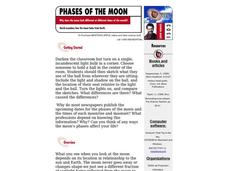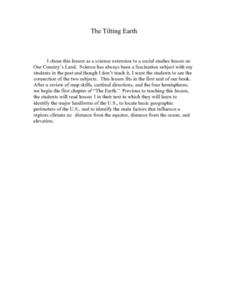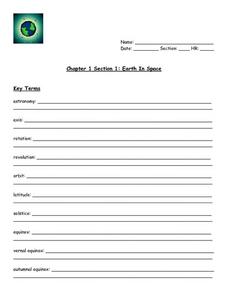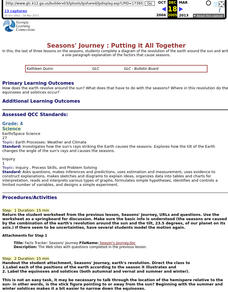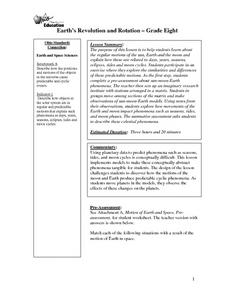Curated OER
Reasons for the Seasons
Learners discover how the Earth's axis of rotation affects the angle of sunlight and the length of day. They take a survey and give the survey out to family members and friends. They tally their findings and then determine the correct...
Curated OER
Seasons
Young scholars name the 4 seasons, discussing the weather, plant life, animal life and and activities of each. Students read the book titled, "Hello Arctic," and and discuss changes in seasons that accompany the story. Young scholars...
Curated OER
Planet Earth
In this Earth learning exercise, students review the characteristics of the Earth including it's rotation and revolution. This learning exercise has 9 fill in the blank and 7 short answer questions.
Curated OER
Phases of the Moon
Learners explore why when you examine the moon depends on its location in relationship to the sun and Earth. The moon never goes away or changes shape-we just see a different fraction of sunlight being reflected from the moon to Earth.
Curated OER
The Tilting Earth
Fourth graders use a styrofoam ball on a stick to represent earth and a light bulb in the center of the room to represent the sun. They walk around the light, holding their sticks at an angle to show the tilt of the earth's axis. They...
Curated OER
Reasons for Seasons
Students model the tilt of the Earth as it orbits the Sun. They explain the meaning and characteristics of solstices and equinoxes. They explain that sunlight hits the Earth at different angles at different locations over the course of...
Curated OER
Seasonal Cycles And Changes
Second graders recall the affect of direct and angled sunlight on the seasons, describe some results of warming soil and air in spring, predict the changes in buds when twigs are placed in water, and taste a product of tree sap and...
Curated OER
Earth in Space
In this reason for the days and nights on earth worksheet, students study the reasons the Earth has days and nights by answering 28 questions about earth's rotation, the equator, the relationship between the sun and moon, and the earth's...
Curated OER
Earth and Seasons
Sixth graders comprehend that the path Earth takes as it revolves around the sun is called its orbit. They also comprehend that the axis is an imaginary line that passes through Earth's center and its North and South Poles. Students...
Curated OER
The Reason for the Seasons; Science, Geography
Students think about what causes the seasons to change, reflect on what they know about seasons and how their lives affected by seasonal changes.
Curated OER
Seasons' Journey : Putting it All Together
Third graders complete a diagram of the revolution of the earth around the sun and write a one paragraph explanation of the factors that cause seasons.
Curated OER
The Earth
Third graders examine the relationship between the Earth and the Sun. They define key vocabulary terms, and in small groups conduct Internet research, exploring a variety of websites. Students answer comprehension questions, and...
Carnegie Mellon University
Introduction to Climate
Begin a full lesson on climate change by demonstrating how carbon dioxide gas contributes to increased temperatures. Be aware that pressure inside the antacid-containing bottle in Activity 2 may cause the lid to fly off; keep viewers at...
Curated OER
Climatic Changes
Investigate the greenhouse effect and global warming with this weather worksheet: scholars describe the seasonal variations of temperature and day length at its greatest and its least. Then they describe the effects of El Nino and how...
Curated OER
Charting Seasonal Changes
Students research the Earth's patterns of rotation and revolution, create a chart and graph of these patterns and use them to explain the causes of night and day and summer and winter.
Curated OER
Apparent Motion of the Sun
Demonstrate the path of the sun across the sky at different times of the year with an engaging science lesson. Learners use a series of questions and diagrams to examine the movement of the sun and appearance of the sky around...
Curated OER
Hello, Sunshine!
Students investigate how the sun travels across the sky at different latitudes using Solar Motion Demonstrator. In this earth science lesson plan, students explain why seasons change. They study how the tilt of the Earth's...
Curated OER
Catching Some Rays
Sixth graders explore the tilt of Earth's axis. For this Earth lesson, 6th graders read a Greek mythology story explaining why there are seasons. Students build a sun-ray gathering tool from styrofoam, glue, thermometers, skewers, and...
Curated OER
Astronomy Test
In this astronomy test, students answer 50 true/false and multiple choice questions about the relationships of the earth, moon, and sun. The test also includes questions about the solar system, galaxies, and the universe. An answer key...
Curated OER
The Celestial Sphere and Circumpolar Motion
Students investigate the celestial sphere and circumpolar motion. In this science lesson, students view an applet, The Celestial Sphere and Circumpolar Motion. Students discuss the Earth's rotation and stellar movement.
Curated OER
Earth's Revolution and Rotation
Eighth graders investigate the regular motions of the sun, Earth and the moon and explain how these are related to days, years, seasons, eclipses, tides and moon cycles. They participate in an exercise where they explore the...
Curated OER
It's A Meteor
Students complete a webquest to find Earth's relationship to the sun. In this webquest lesson plan, students complete tasks to understand the effect of the sun on weather and time. Students create a multimedia presentation as...
Curated OER
Seasons and Cloud Cover, Are They Related?
Students use NASA satellite data to correlate cloud cover over Africa to the solar declination.
Curated OER
Surface Air Temperature Trends of the Caribbean
Students use real satellite data to determine the changes in near-surface air temperature at different times of the year over the Caribbean Sea. They discover how Earth's tilt causes seasonal differences in incoming solar energy. They...





